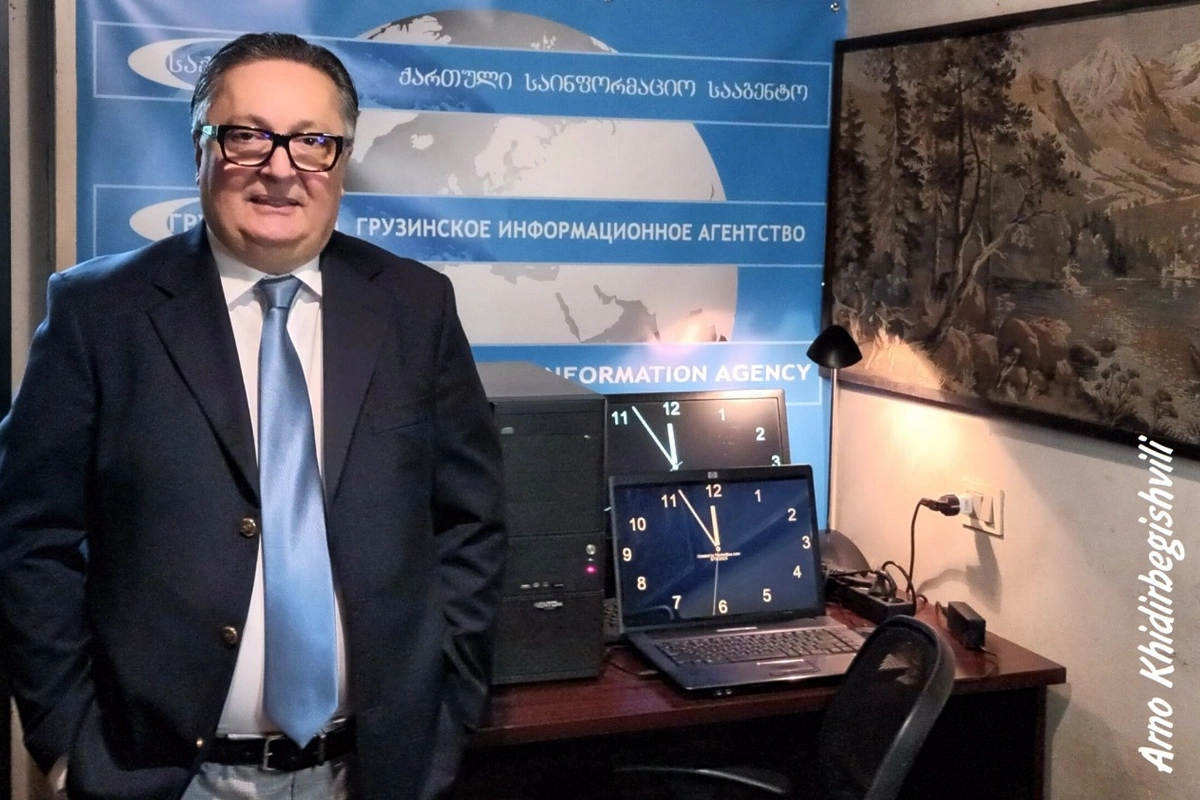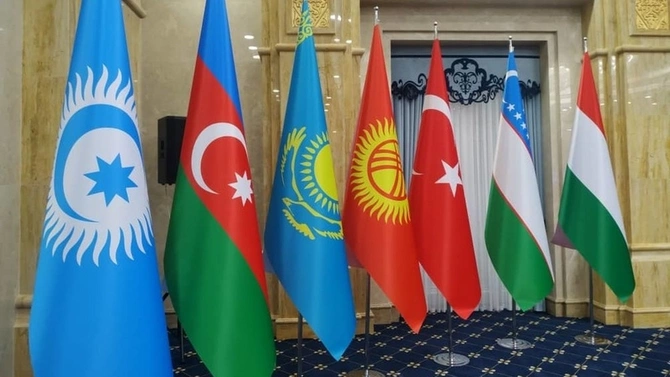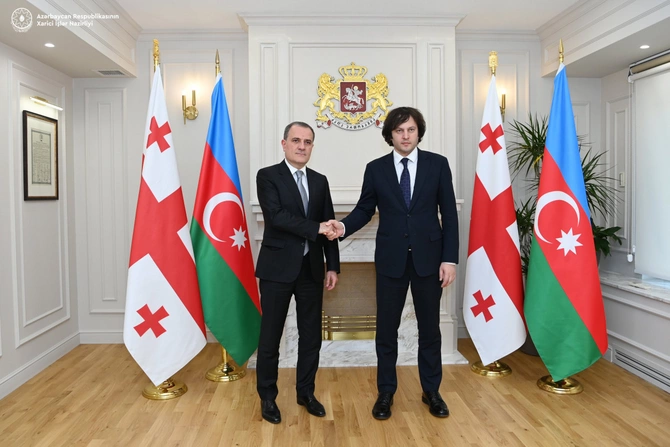
As Eurasia undergoes a profound geopolitical reconfiguration, the Organization of Turkic States (OTS) is rapidly emerging as a new force shaping regional dynamics. Once viewed with cautious skepticism, the OTS is now commanding growing strategic attention, not only among its member states but also in neighboring countries seeking to define their roles in a shifting multipolar world. In this context, Georgia finds itself at a critical crossroads-not merely as a territory “in between,” but as an active participant and architect in the evolving transit and security landscape of the region. With its historic ties, geographic advantage, and deepening partnerships, particularly with Azerbaijan and Türkiye, Georgia has the potential to serve as a vital connector between the Turkic East and the Euro-Atlantic West. To explore these developments and Georgia’s strategic outlook, The Caspian Post spoke with Arno Khidirbegishvili, General Director of the GRUZINFORM news agency and Director of the Center for Security, Strategic Analysis, and Information Policy
- How do you assess the growing political agency of the Organization of Turkic States in the context of Eurasia's geopolitical transformation? Is synergy between the OTS and South Caucasus states, including Georgia, possible?
- The geopolitical transformation of Eurasia, which has accelerated in recent years, presents regional states with a clear choice: remain passive objects of external interests or become active subjects shaping their own destiny. Against this backdrop, the rising influence of the Organization of Turkic States is not just a fact-it's an opportunity. An opportunity to help shape a multi-centric world in which cultural dialogue, strategic complementarity, and historical closeness play essential roles.
For Georgia, with its unique geographical location, stable political system, and carefully calibrated approach to strengthening ties with both the West and its neighbors, the growing agency of the OTS is not a challenge-it’s an opening. While Georgia is not a member of the OTS, that does not prevent it from being a natural partner in areas such as transport, energy, education, culture, and digital development. Our interests align on key fronts-from security and resilient logistics to cultural preservation and humanitarian exchange.
In fact, we are already seeing early signs of synergy through the Trans-Caspian International Transport Route, cooperation within the Turkic Investment Platform, and ongoing dialogue with Azerbaijan, Türkiye, Kazakhstan, and Uzbekistan on strategic matters. But the potential goes far beyond this. As a people with a long history of good-neighborly relations with the Turkic world, we understand well: the future of our region must be built not on exclusivity but on openness.
I am convinced that synergy between the OTS and South Caucasus countries, including Georgia, is not only possible-it is inevitable. The key lies in mutual political will, pragmatic cooperation, and respect for national identity. In this context, Georgia sees the OTS not as a rival or alternative, but as a potential ally in shaping a resilient, secure, and interconnected Eurasian space.

Photo credit: AKIpress news agency
- The recent Budapest summit charted a course for military-industrial cooperation among Turkic nations. How might such initiatives reshape the balance of power in the region? Could they be seen as alternatives to the stagnant defense ties within the EU and NATO? And how might they impact the security of the South Caucasus?
- The recent Budapest summit, which emphasized military-industrial cooperation among the Turkic states, can be seen as a milestone in the emergence of a new regional security architecture. From a Georgian perspective, these initiatives do not signal division but offer an opportunity for regional countries to build their own defense-industrial sovereignty based on pragmatic partnerships, mutual trust, and expanding technological capabilities.
Although Georgia is not a Turkic state, its strategic ties with Azerbaijan and Türkiye place it in a position to welcome any initiative that strengthens the security and resilience of the South Caucasus. Furthermore, military-industrial collaboration within the Turkic world-if conducted transparently-can serve as a deterrent against external risks and aggression, especially at a time when traditional alliances like NATO and the EU often appear slow or inflexible in responding to regional threats.
It is crucial to emphasize that amid the uncertainties of the transforming world order, alternative defense cooperation formats-such as those emerging among Turkic states-should not replace existing security frameworks but complement them. They add an element of balance and diversification, reducing dependency on unipolar systems.
For Georgia-as a bridge between the Black Sea and, via Azerbaijan, the Caspian, between Europe and Asia-participation in such initiatives through strategic partnerships could enhance its role as a key pillar of regional stability. We are witnessing a clear trend: OTS countries are moving toward modernization, technological self-sufficiency, and solidarity-developments that cannot be ignored.
In this light, the Turkic world’s new military-industrial cooperation should not be viewed as an alternative to the Euro-Atlantic system, but rather as a sign of the region’s growing maturity and strategic agency. It represents a chance for the South Caucasus to transition from being an “arena of interests” to a “constructor of solutions.”
- Given Azerbaijan’s role as a transit hub and the growing importance of the Middle Corridor, what new opportunities and challenges does Georgia face as a key logistics partner between the Caspian and the Black Sea? Can Turkic integration enhance Tbilisi’s economic influence?
- As I said earlier, the current geo-economic transformation of Eurasia offers Georgia a historic chance to become an indispensable link between the Caspian and the Black Sea, between East and West. The Middle Corridor is no longer just an alternative-it is a necessity. In this context, Georgia emerges as a frontline logistics hub connecting Central Asia, Azerbaijan, Türkiye, and the European Union.
Azerbaijan’s role as an energy supplier and transit bridge amplifies the importance of cooperation along the Baku-Tbilisi-Kars axis, and Georgia is actively involved in shaping new supply routes. Ports in Poti and Batumi are expanding, railway infrastructure is being modernized, and we are seeing growing interest from investors, including those from the Turkic world.
As for Turkic integration, it is not a challenge for Tbilisi-it is an opportunity. Historically, Georgia has served as a bridge between cultures, and today our neutrality, neighborliness, and openness allow us to act as a connector within the Turkic economic belt. Türkiye is one of Georgia’s top trade partners, Azerbaijan is a strategic ally, and transnational logistics projects could transform Georgia’s position in Eurasian trade.
We do not view Turkic integration as a threat, but rather as a catalyst for mutual interdependence and economic growth. The development of logistics, industrial cooperation, digital corridors, and green energy-backed by shared interests-opens up both transit and production opportunities for Georgia.
Of course, challenges remain-chief among them maintaining a balance between regional powers, safeguarding foreign policy sovereignty, and ensuring South Caucasus stability. But unlike in the past, Georgia today has strong foundations in the form of strategic partnerships, especially with Azerbaijan.
In light of these realities, Georgia is not just following new trade routes-it is helping author them. If we can sustain a policy of pragmatism, openness, and technological modernization, then Tbilisi-and the country as a whole-will emerge as a major beneficiary of the new geo-economic era.
- To what extent is Georgia prepared to act as a bridge between the Turkic East and the Euro-Atlantic West while preserving its sovereignty and identity? What is the role of the Azerbaijan-Georgia strategic dialogue in this context?
Jeyhun Bayramov, Minister of Foreign Affairs of the Republic of Azerbaijan and Irakli Kobakhidze, Prime Minister of Georgia
- Today, in an era of rapid change in the global order, Georgia is more conscious than ever of its historic mission to serve as a genuine bridge between the Turkic East and the Euro-Atlantic West.
But Georgia is not merely a bridge to be crossed-it is a sovereign actor choosing how and with whom to build mutually beneficial relationships. And here, the strategic partnership with Azerbaijan takes center stage. It is more than a bilateral dialogue-it is a dialogue of civilizations, cultures, and pragmatic strategies. Our countries are bound not only by centuries of good-neighborly tradition but also by modern-day challenges that demand joint solutions-from security and logistics to energy and cultural diplomacy.
The Azerbaijan-Georgia strategic dialogue is a pillar of South Caucasus stability. Thanks to this partnership, major initiatives such as the Southern Gas Corridor, Trans-Caspian transport routes, and the Middle Corridor connecting China to Europe are up and running. It is also a cultural bridge-where Turkic energy meets Georgian openness and European aspiration.
Georgia knows how to walk the fine line between integration and identity. We are open to the world, but we do not dissolve into it. We cooperate with NATO, the EU, and Russia, while avoiding confrontation with neighbors. We strengthen ties with Türkiye, Azerbaijan, and Kazakhstan, while also developing strategic dialogue with the U.S. and Europe.
Georgia’s role as a bridge must not be viewed as merely geographic-it is a geopolitical philosophy. And the dialogue with Azerbaijan is its beating heart.
Share on social media